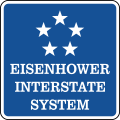Interstate Highway System
The Interstate Highway System is a system of freeways in the United States. It was first designed by Dwight D. Eisenhower in the 1950s. The Federal Aid Highway Act of 1956 was used to pay for construction.[1] It was mostly built from the 1950s through the 1960s, but more freeways were built later. It is now about 47,000 miles long. Some interstates have tolls, but most do not.[2] Most interstates have rest areas every few dozen miles.
What is needed
To be an Interstate Highway, there cannot be any stoplights. To get on or off the freeway, an interchange is needed. The speed limit is usually at least 55 miles per hour. It must have at least two lanes going each way. The lanes must be at least 12 feet wide.[2] There has to be a median or barrier between cars going different directions.
Numbering
North-south interstates have odd numbers. The numbers go up from west to east. East-west interstates have even numbers. The numbers go up from south to north. One and two digit freeways go long distances. Three digit freeways go into or around cities.[2] Freeways that go into cites are called spur routes and start with an odd number. Freeways that go around cities are called loop routes and start with an even number. The last two digits in a spur or a loop route are the same as the freeway it started from.
Interstate Highway System Media
900 mm by 900 mm (36 in by 36 in) Eisenhower Interstate System sign, made to the specifications of the 2004 edition of Standard Highway Signs (sign M1-10a). Uses the Roadgeek 2005 fonts. (United States law does not permit the copyrighting of typeface designs, and the fonts are meant to be copies of a U.S. Government-produced work anyway.) Colors are from
I‑55 under construction in Mississippi in May 1972
1957 aerial photograph showing a recently constructed interchange on I-5 in Glendale, California
Commemorative sign introduced in 1993. The system was established during Dwight D. Eisenhower's presidency, and the five stars commemorate his rank as General of the Army during World War II.
The fervor of urban renewal led to the routing of Interstate 81 through the middle of Syracuse's 15th Ward in the 1960s. The viaduct is now slated for demolition.
I-95 in Columbia, Maryland, built to modern standards.
A rural stretch of I-5 in California; two lanes in each direction are separated by a large grassy median and cross-traffic is limited to grade separations such as this overpass.
Related pages
References
- ↑ "The Interstate Highway System". History. Retrieved 23 July 2014.
- ↑ 2.0 2.1 2.2 "All About Interstate Highways". AARoads Interstate Guide. 29 July 2008. Archived from the original on 30 June 2014. Retrieved 23 July 2014.










